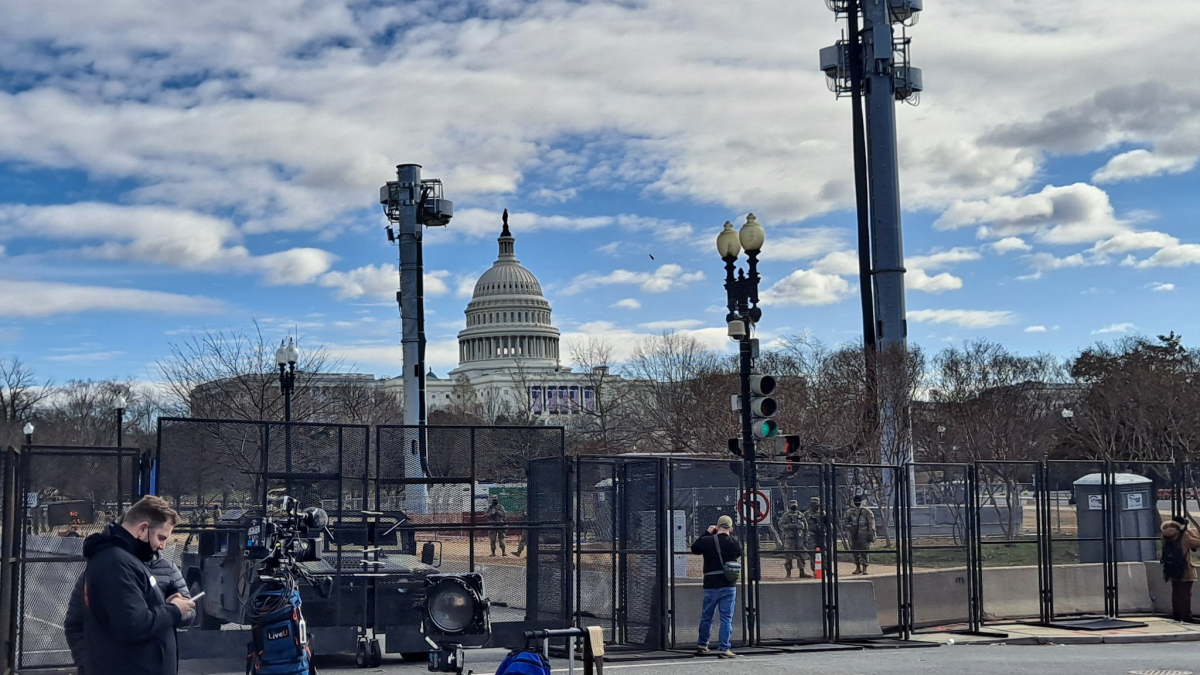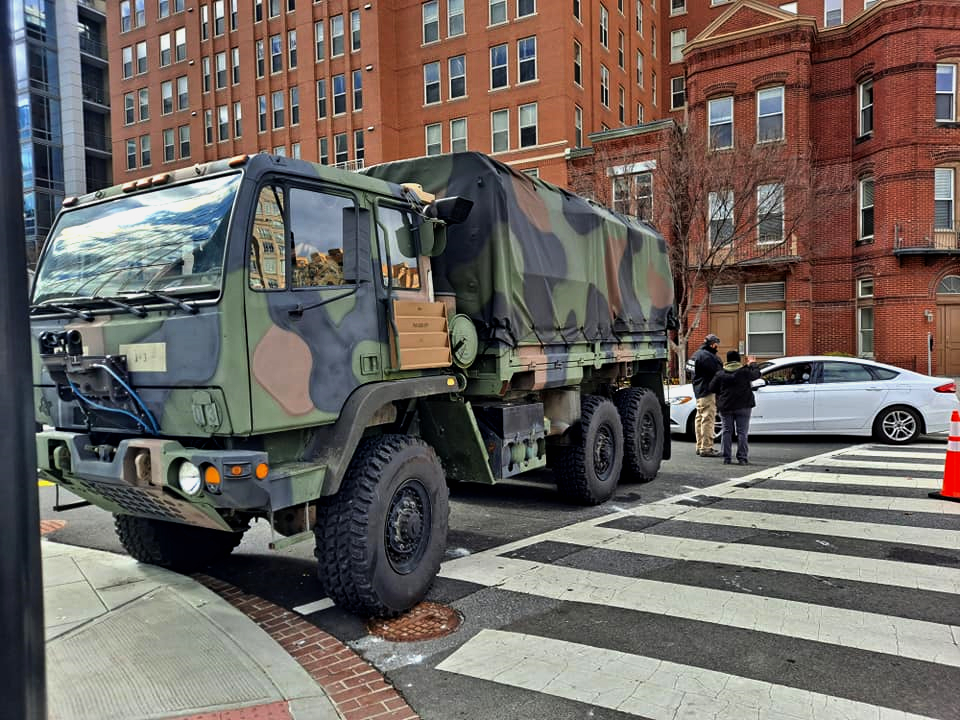Made in the USA: A Co-opted Democracy that Feeds Its Own Insurrection
By Patricio Zamorano
From Washington, DC
“That is not who we are,” insists the U.S. political class after the grave events of January 6 when a mob of Trump supporters brutally invaded the Capitol here in Washington, DC, leading to the loss of five lives. An entire nation, if not the whole world, has been traumatized, unable to believe that these images came from a developed country in North America.
The key questions are simple, “Why” and “How?” The answer is visible in the raw emotions on the demonstrators’ faces, strategically veiled in the concept of “American Exceptionalism” that has done so much damage throughout the history of the country’s democracy. The rest of the world is also astounded to see the U.S. trip up in its strategic economic, political, and ideological trajectory. But the dozens of countries that have historically been subjected to sanctions (most of them unilateral and therefore illegal under international law) had already seen through the veil.
Institutional control over the people
The destructive intent in the mostly white faces of Trump supporters has been part of U.S. society since the country was founded. The phrase “that is not who we are” fails to acknowledge how someone as unbalanced as Trump was so easily able to assume the most powerful position on earth.
I propose and will analyze how this is because the United States has a sort of co-opted democracy, with a deep-seated history of plans to filter, redirect, frame, and control the cultural, popular, political, and electoral expressions of its citizens. All the intricacies of government institutions help explain this framework. This is why Trump was able to quickly make vast inroads towards controlling the base of the Republican Party, and obtain more than 70 million votes on November 3—more than any previous Republican candidate. A history of citizens’ inadequate democratic access to power and hatred of government are partially responsible for unleashing the events of January 6. Trump successfully manipulated these sentiments and used them for his own personal benefit.

Congress is able to overturn the Electoral College vote
It all starts with the Electoral College. The general public is not aware that in addition to the fact that the system does not allow voters to select their president directly, Electoral College votes determined by the popular vote in each state can be nullified, changed, or excluded by Congress.
What the Senate was doing on January 6, certifying the votes submitted by each state in the Union, in modern times had become no more than an act of protocol. However, Trump was exerting maximum pressure to exploit the legal framework underlying those proceedings: the ability to thwart the will of the people by overturning the results in the states he had lost, as had been done on a few occasions in the country’s history.
But there is more. The Electoral College rules indicate that if Congress rejects the votes submitted by some states and no candidate reaches the required 270 votes, CONGRESS DECIDES WHO BECOMES PRESIDENT AND VICE-PRESIDENT. Excuse the all caps, but I want to clarify the academic (and dramatic) reasons that U.S. democracy is simply a system of tutelage over the popular vote.
In addition, the “electors” elected by each state are not legally bound to cast their Electoral College vote for the candidate that won the popular vote in their state. Technically, they are allowed to change that vote. In modern times this has not happened because of a de facto sense of “honor” to respect the will of the people, and some state laws have tried to ensure that the vote submitted to Congress faithfully reflects the popular vote. But the law is clearly designed to not necessarily respect the votes of average citizens.
The mere fact that the Electoral College has awarded the presidency to people who did not win the popular vote is in itself an aberration from democracy that the American people passively accept. We know that Trump received 3 million votes fewer than Hillary Clinton. Al Gore received more votes than George Bush. And yet, the Republican was the one who gained power in these cases.
One of the positive aspects often mentioned about the Electoral College is that it allows small states to remain relevant. The idea behind this is that candidates must pay attention to those small states, visit them, and campaign in them. But the math of modern elections negates that reasoning. The system is so closed and controlled that elections are now decided by a small number of swing states that have become kingmakers, such that elections are not decided on the basis of 150 million votes, but rather a few thousand. This comes down to the micro level of counties: Trump actually won in 2016 because he was able to win some key counties in those swing states. In other words, he won by a factor of tens of thousands of votes, not millions.
Voting had been a privilege of class, race and gender
But the main reason the Electoral College exists is because the colonists who founded the nation and drafted the Constitution did not believe in the people’s capacity to correctly choose their own destiny. The young republics in post-independence Latin America suffered from the same phenomenon. All the countries of the Americas took at least 150 years to let the “uneducated masses,” as they called them, vote in free elections. Winning the right to vote was a long process laden with abuse, which used arbitrary means to limit suffrage based on educational, financial, social status, race, and gender requirements. Women’s right to vote was shamefully only granted little over a half century ago! Similar to the situation of African Americans.
U.S. democracy negates the existence of other parties. The entire system in the U.S. is designed to limit people’s choices to finite limits. The Supreme Court is a branch of government that dominates the lives of over 300 million souls with its lifetime appointments of justices that are not elected by anyone, except a handful of senators and the President.
The U.S. electoral system uses the full force and money of the judicial system to keep independent political parties from being an option to staff Congress, not to say the White House. For example, the Democratic Party spends millions of dollars on each election to keep the Green Party off the ballot. The Republican Party has buried the Tea Party and the Libertarians to keep them out of the running, except to rally behind the GOP candidate.
Donald Trump and much of what he represents is an anomaly for the Republican Party, given its political and religious values. The only reason he ran for the party’s nomination was to have a shot at the presidency; he had previously been a Democrat and supported Bill Clinton. Similarly, Bernie Sanders is an anomaly within the Democratic Party, with his socialist values that do not fit with the centrist line of Obama’s party. But Sanders, like Trump, had no other option. In any other country these candidates would have founded their own party, created strategic alliances with a variety of forces, and been competitive. According to all the data, it is quite possible that either Trump or Sanders alone could have garnered a significant percentage of the vote. Through alliances in a multi-party system, the US could have a truly democratic alternation of power, instead of the two-party Democrat/Republican dictatorship.
Violence has been part of the recipe for change
Once again, the phrase “that is not who we are” in response to the brutal violence exhibited on January 6 is also divorced from U.S. reality. All popular movements demanding far-reaching change have gone through a trial by fire. And the country’s two movements for true social revolution were shaped by savage violence. The first was for the abolition of slavery and it cost 600,000 U.S. lives through a cruel and vicious civil war. It was so brutal that the pro-slavery Confederate flag continues to be a source of pride and pain for millions of Southerners, some of whom led the siege of Congress this January.
The second movement for social revolution was the civil rights struggle of the mid-20th century, viciously repressed in streets throughout the country, particularly the South. Many of its leaders and some politicians who supported them were assassinated, including Martin Luther King, whom we celebrate this week, along with Malcolm X, John F. Kennedy, Robert Kennedy, Louis Allen, Willie Brewster, Benjamin Brown, Johnnie Mae Chappel, James Chaney, Addie Mae Collins, and more than 100 others, many of whom are unknown to younger generations. It is a massacre that has been obliterated from modern memory.
State-perpetrated violence under Lincoln’s presidency during the Civil War so profoundly traumatized Southerners that stubbornly defended the aberration that was slavery, that this left them with a permanent, visceral, and irrational hatred for what the government symbolizes. Its legacy is today’s armed civilian militias, a cult of firearms, and an almost religious devotion to the Second Amendment.
Many of the January 6th insurrectionists were educated people
The most radical segment of white culture (and other races, too) in the U.S. revolves around the role of government as an enemy that oppresses Americans in their private lives. The anti-imperialist outlook the world’s peoples have gained after suffering military actions or covert U.S. intelligence operations, is translated ideologically by white supremacist militias into distrust of the “deep state.” In this sense, what we witnessed on January 6 was not the actions of an uneducated, vicious mob. While much of Trump’s base is made up of rural people with lower levels of education, higher rates of poverty, and more precarious employment, as the surveys indicate, the mob that attacked Congress included state legislators, college professors and academics, corporate managers, attorneys, police officers, high- and low-ranking members of the military, firefighters, physicians, and nurses. And although Trump was impeached on very clear grounds of inciting insurrection against a branch of government, 197 Republican members of Congress voted against it, and 82% of Republicans do not believe Trump is responsible for the attack on the Capitol. Very revealing statistics indeed.
Government is the enemy, even if it provides social assistance
It is clear as day. Claims of “that is not who we are” have no grounding in the actual social psychology of the country. The distrust and disdain a large number of people hold for their government is so profound that these impoverished and conservative white people would rather reject the free medical care the government offers than accept what they view as a “socialist” threat. Let’s examine this point: the repudiation of socialism is not necessarily against the social welfare model (for better or worse, the US has some socialist infrastructure, although it does not call it that). What people on the Right fear is social control; they perceive threats from a government that will impose its decisions on their lifestyle, values, and private space just like it did in the 19th century during the Civil War.
This sentiment is so strong that they would rather die of preventable diseases than accept free health care from the government. They would rather give free reign to the gun worshippers than limit firearm sales after the massacre of twenty innocent children at Sandy Hook Elementary. After that tragedy, not a single significant piece of gun control legislation was passed because all efforts were rabidly rebuffed by the gun lobby.

Trump is a megaphone
The “accident” of Trump’s election simply gave voice from the White House, perhaps for the first time, to a large number of conservatives who had been harboring a mixture of contained rage and fear of two hundred years of political and institutional oppression. The Republican Party is not a comfortable home for the extreme values that have come to be called “Trumpism.” Its leaders in Congress and the Republican National Committee defend the current institutional framework, formal structures of power, and law and order. For this reason, dozens of Republican officials have received death threats by those who invaded Congress. Based on the polls and the still strong support enjoyed by Trump, maybe hundreds of thousands agree with the insurrectionists from their own homes far from the seat of power in Washington, DC.
Violence is the public manifestation of the country’s profound need for democratic reform. Progressive groups agree on the need for reform, but push for a democratic opening primarily through legal efforts to break the authoritarian siege, and try to mobilize people in the streets to build power out of civil society (unions, professional guilds, the media, grassroots movements, and activism). But operating at that level leaves people trapped by the system; they will always be left out of electoral politics and the power to effect real change through Congress, the White House, and the Supreme Court.
A multiparty system and direct election of the president. What’s not to like?
This nation that imposes its hegemony on the rest of the planet in the name of democracy, is at its ideological core a repressor of political pluralism that refuses to allow the people to elect their presidents directly. This is a country that cannot agree to depose a head of state who has openly committed insurrection (and other far more serious crimes) due to technicalities imposed by the Constitution to thwart any change to this model of tutelage democracy. Meanwhile there is a Supreme Court of justices made omnipotent by their life terms who cannot be changed without overwhelming majorities. The legal and electoral system attacks any new parties that try to bring the country’s diverse voices into the game.
Donald Trump’s unhinged show of the past four delirious years has, ironically, pulled back a few inches the veil that was protecting a system with profoundly undemocratic roots. The political class would do well to make an example of Trumpism by trying to quickly bury it. The risk is that the need to reform institutions, that would return part of the political capital and the right to real access to formal power to the American people, would also be neutralized for decades. That would constitute a political and social crime against future generations.
Patricio Zamorano is a political scientist and academic living in Washington DC. He is Co-Director of COHA. Twitter: @Zamoranoinfo
Translation from original version in Spanish, by Jill Clark-Gollub, Assistant Editor/Translator at COHA


